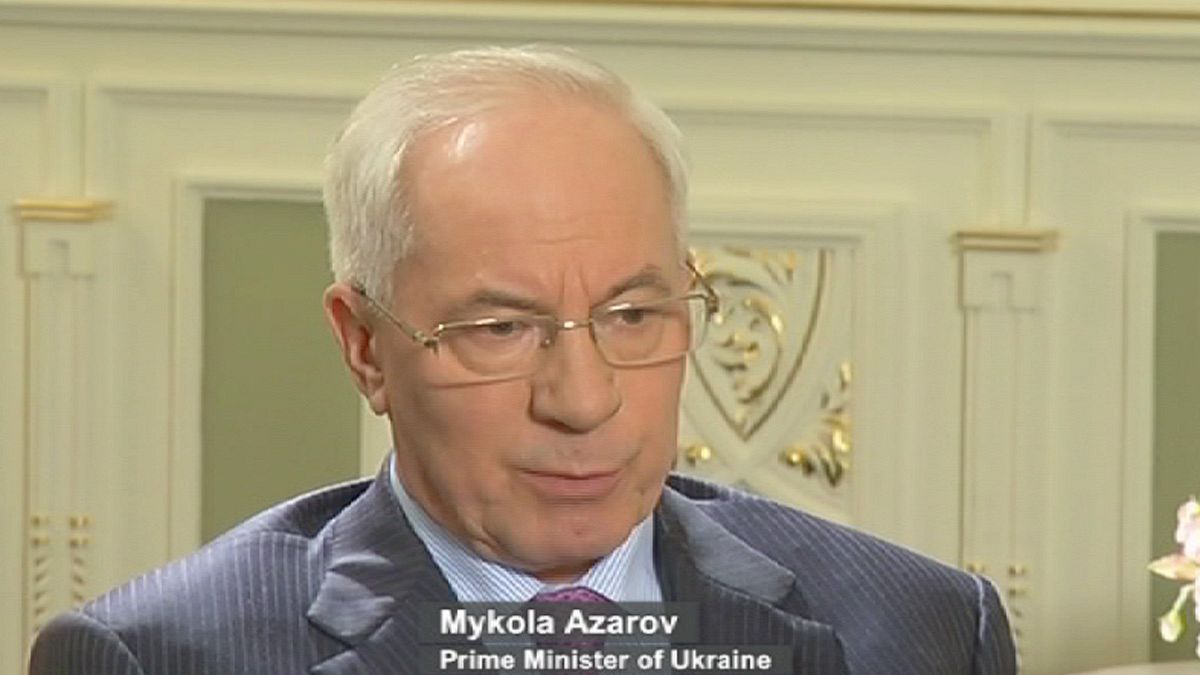Mykola Azarov became Ukraine’s prime minister in March 2010. Since then his premiership has come under sharp focus in Europe and beyond with concerns over the treatment of former PM Yulia Tymoshenko who is currently serving a seven year prison sentence on charges of abuse of office. Mykola Azarov spoke with Euronews correspondent, Sergio Cantone.
Sergio Cantone euronews: “Prime minister welcome to euronews. There are a lot of concerns in the EU, especially among the EU leaders about the situation concerning the rule of law in Ukraine, Merkel, the chancellor of Germany compared Ukraine to a dictatorship, compared Ukraine to Belarus, so what is your idea about it?
Mykola Azarov, Ukraine’s Prime Minister: “Just a few days spent in Ukraine, or maybe more, would be enough for anyone to be sure that there’s no dictatorship in Ukraine, and neither is there any political repression. Democratic political parties are active in Ukraine, some of them are represented in the parliament, some of them not. We have total freedom of expression. I personally regard (Mrs. Merkel’s) remark to be politically incorrect. It doesn’t help to strengthen bilateral relations between Germany and Ukraine, and moreover, between Ukraine and the EU as a whole.
Euronews: “Don’t you think that you have to find a way out from this situation that is putting your country in a terrible stalemate vis-à-vis your partners in the west?”
Mykola Azarov: “Mrs. Tymoshenko was not convicted for her political beliefs. She was convicted for forging an official document called the Directive of the Ukraine’s government. Using this forged document she made (her subordinates) sign a very unfavourable and detrimental contract for gas supplies with Russia. Now our country has to pay almost double the price for gas purchases compared to current average European prices.”
Euronews: “So, anyway, you think that the EU leadership is drawing conclusions based on wrong legal information about the situation in this country?
Mykola Azarov: “I’ve asked a simple question about her actions. Was it a political decision or a crime? And I would like the respected European lawyers to answer this question.”
Euronews: “They already gave the answer and it is that this is a politically motivated judgement, they say that the Ukrainian government, the current Ukrainian power wants to get rid of an inconvenient opposition leader, Yulia Tymoshenko, that is their position.”
Mykola Azarov: “I would like to once again point out all the circumstances related to the case. I wonder whether the European leaders have full information about it. We are ready to provide such information. It is an irrefutable fact. So there is a question: was the investigation politically motivated, or was it called for by huge losses sustained by our country because of her actions?”
Euronews:“Prime minister I understand but don’t you think that there is also the fact that there is a lack of trust in the Ukrainian justice system abroad as well as in Ukraine?”
Mykola Azarov: “That’s precisely why we’ve undertaken a huge task of reforming our judicial system. A new Criminal Procedural Code of Ukraine will come into effect that would broaden the citizens’ rights. This is why we wage a real war against corruption. The scale of this fight is significantly wider than, say, two years ago. It’s really a huge fight against corruption. We are trying to deregulate the economy because we see the problem and we do our best to create a favourable investment climate in Ukraine. And we will succeed!”
Euronews: “Are you going to surprise, in some way, somehow the rest of Europe by probably letting Tymoshenko go treat her health problem abroad?”
Mykola Azarov: “Let us not jump the gun. She is now undergoing treatment which will enable us to understand whether any further medical help is required. After that, if there is a conclusion by competent and authoritative medical bodies that adequate treatment cannot be provided in Ukraine, but can be granted at some facility outside Ukraine, only then could Ukraine’s leadership can consider such a possibility, based, which I want to stress, purely on humanitarian grounds. It is clear though, that such a decision would require changes in appropriate laws and regulations.”
